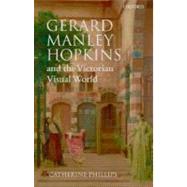Gerard Manley Hopkins and the Victorian Visual World
, by Phillips, Catherine- ISBN: 9780199230808 | 0199230803
- Cover: Hardcover
- Copyright: 2/3/2008
The first of eight volumes of Hopkins's Collected Works to be published, Oxford Essays and Notes presents a remarkable cache of previously unpublished papers, including forty-five essays which Hopkins produced during his undergraduate career at Oxford (1863-1867), only seven of which werereproduced in the 1959 edition of Journals and Papers. Topics range from Platonic philosophy to theories of the imagination, from ancient history to then-contemporary politics and voting rights. Also included are notes from a commonplace book, a remarkable 'dialogue' about aesthetics (featuring afictionalized John Ruskin figure), and the lecture notes Hopkins prepared in the winter of 1868 while teaching at John Henry Newman's Oratory School in Birmingham-writings in which he explores, for the first time, the theories of inscape and instress so central to his poetic practice. The edition isfully annotated and provides a detailed introduction that situates historically Hopkins's academic and creative efforts.The twelve notebooks represent Hopkins's intellectual and aesthetic development while studying with some of the greatest scholars of the era (Benjamin Jowett, Walter Pater, and T. H. Green), as well as the ethical and spiritual anxieties he wrestled with while deciding to convert to Catholicism(John Henry Newman received him into the Church in 1866). Hopkins never wrote to please his tutors or the university professors-he wrote vividly and searchingly in response to the challenges they presented. Whether evaluating Aristotle's Nicomachean Ethics, the role of 'neutral' England in theAmerican civil war, or the comparative merits of classical sculpture, his first instinct was always to frame the difficult questions involved and work towards a 'counter' argument.






